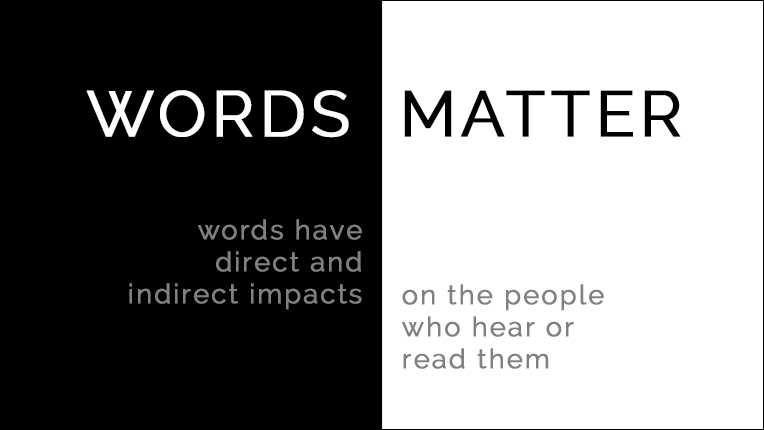Celebrate Disability Pride Month with ACM
"Accessibility in Computing: Trends, Challenges and Opportunities."
Date: July 10, 2024
Time: 11 AM - 12 PM EST
Description: The ever-changing landscape of technology, the computing industry, and resulting societal impacts carry great potential for persons with disabilities. On July 10, 2024 at 11 AM EST, the ACM DEI Council hosted a panel titled, "Accessibility in Computing: Trends, Challenges and Opportunities." Panelists explored a range of topics about the current trends in accessibility in computing and how the industry is incorporating inclusive designs to meet diverse needs. Panelists disucssed the gaps in accessibility that technology companies and how others should address creating a more inclusive digital space. The panel was moderated by Dr. Stephanie Ludi. Panelists featured were: Drs. Rua Williams, Shaun Kane, and Raja Kushalnagar.
Moderator
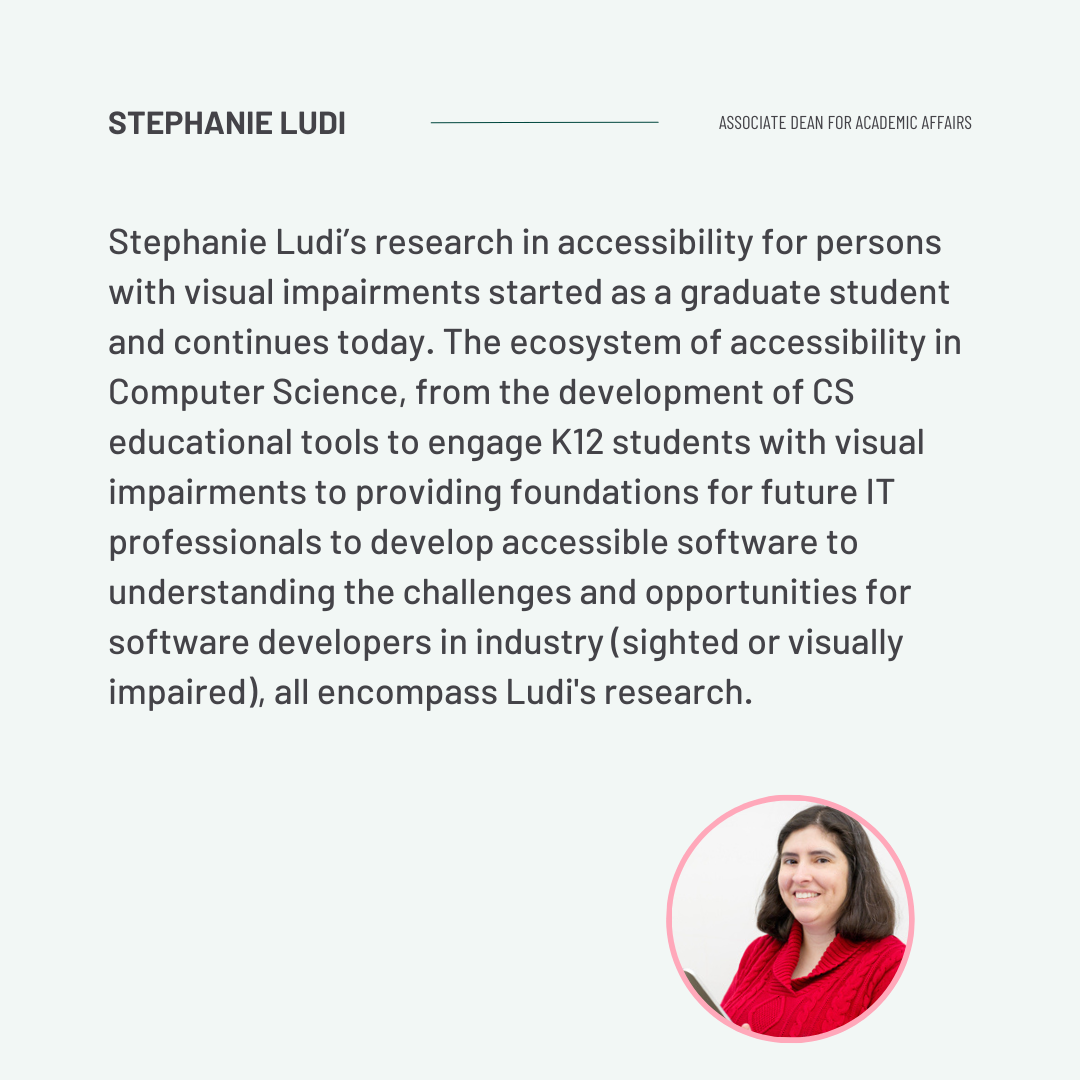
Dr. Stephanie Ludi
Dr. Stephanie Ludi is an Associate Dean for Academic Affairs in the College of Engineering at the University of North Texas. Dr. Ludi earned her baccalaureate degree from California Polytechnic University, San Luis Obispo and her PhD from Arizona State University. Her research in accessibility for persons with visual impairments started as a graduate student and continues today. The ecosystem of accessibility in Computer Science, from the development of CS educational tools to engage K12 students with visual impairments to providing foundations for future IT professionals to develop accessible software to understanding the challenges and opportunities for software developers in industry (sighted or visually impaired), all encompass Dr. Ludi's research. Work has been funded by the National Science Foundation, as well as philanthropic foundations.
Panelists
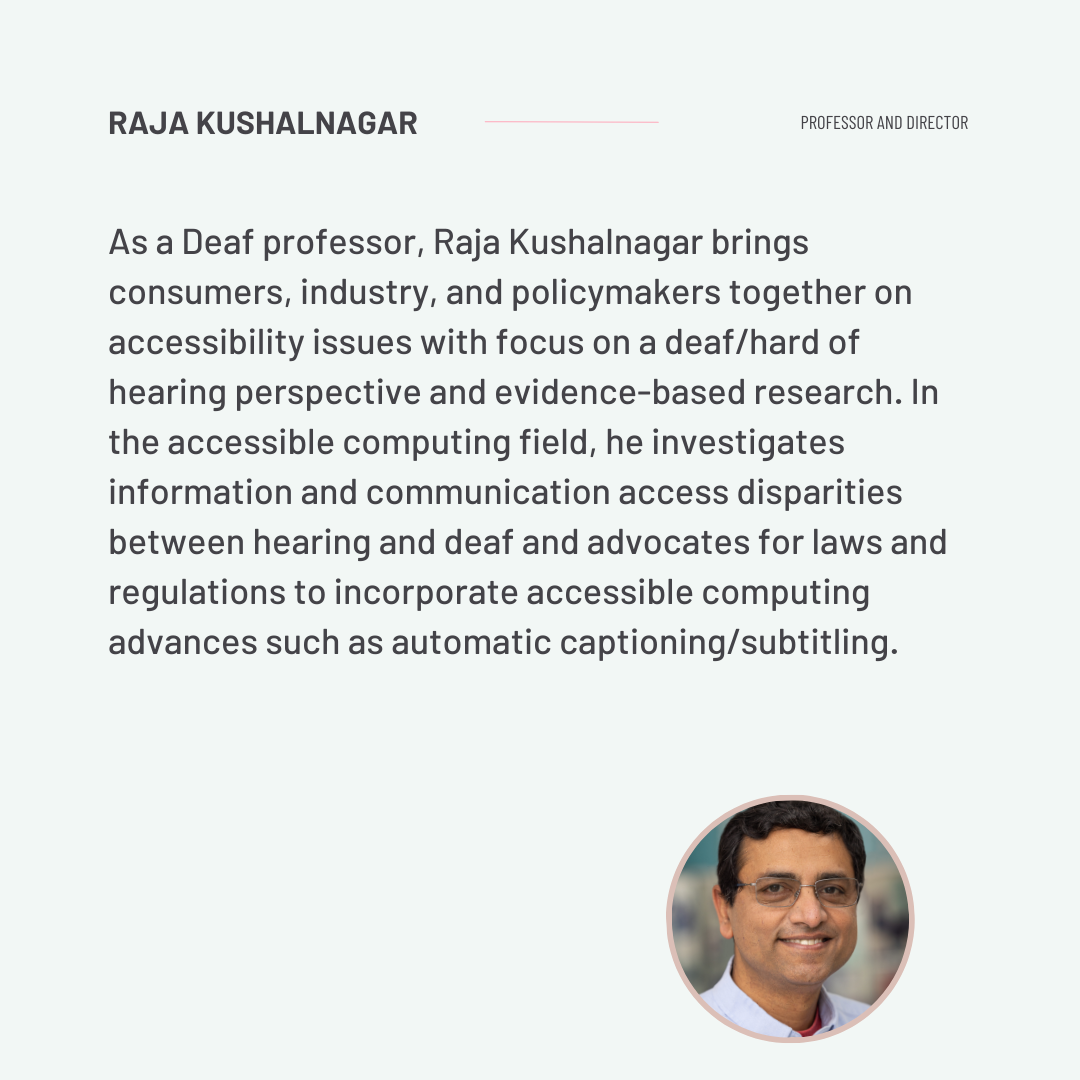
Dr. Raja Kushalnagar
Dr. Raja Kushalnagar is a Professor and Director of the Information Technology undergraduate program and Accessible Human-Centered Computing graduate program at Gallaudet University in Washington, DC. With over fifteen years of experience in the accessible technology field and his own experiences as a deaf individual, Raja brings a wealth of lived experience and research to the field. He focuses on strategic planning, local industry, alumni relations, and faculty support.
As a Deaf professor, he brings consumers, industry, and policymakers together on accessibility issues with focus on a deaf/hard of hearing perspective and evidence-based research. In the accessible computing field, he investigates information and communication access disparities between hearing and deaf. and advocates for laws and regulations to incorporate accessible computing advances such as automatic captioning/subtitling. Raja focuses on increasing the numbers of people with disabilities in the computing pipeline through community involvement. He serves on the NSF-funded AccessComputing Leadership Corps, and as a board member for the New York School for the Deaf, and Computing Research Association Widening Participation (CRA-WP).
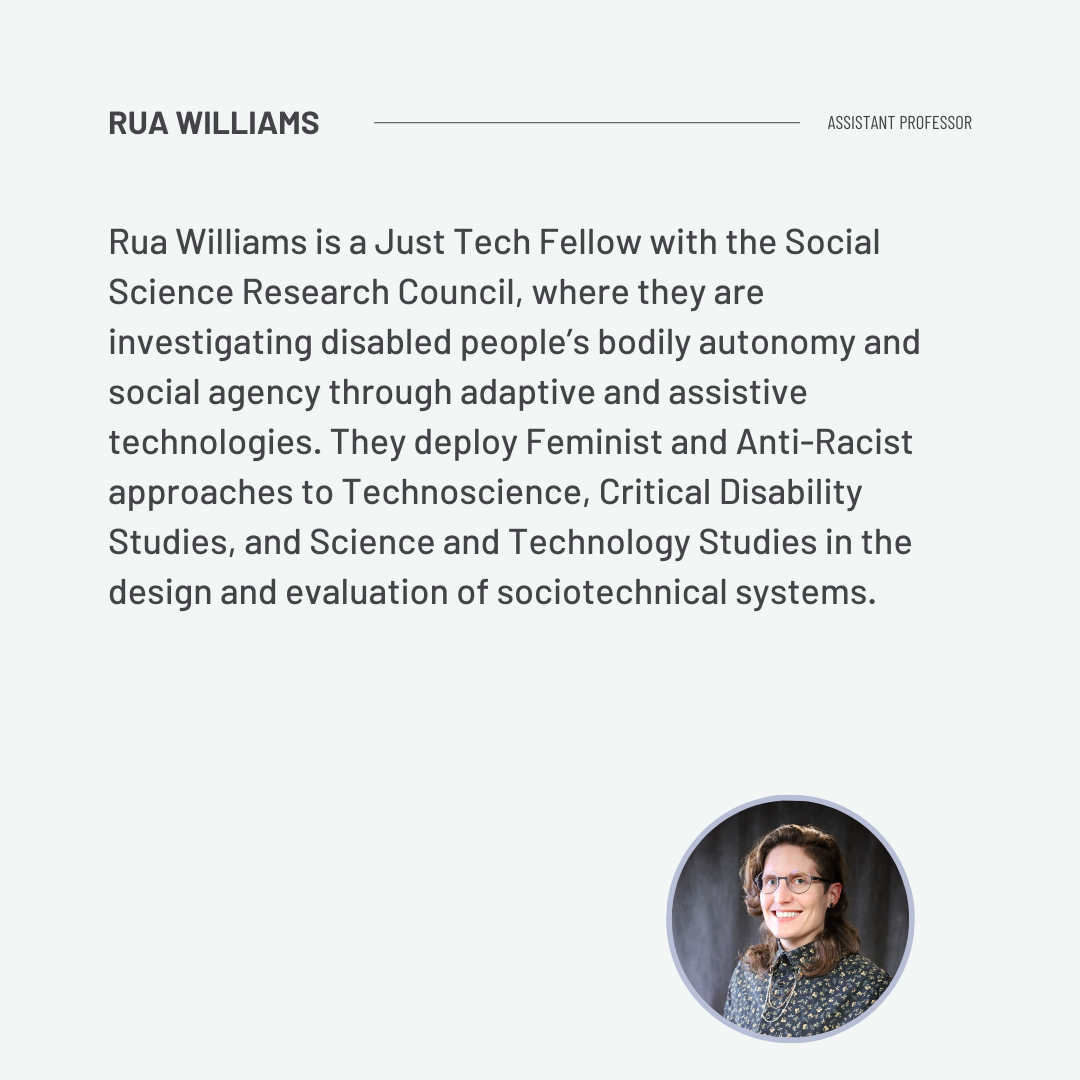
Dr. Rua Williams
Dr. Williams is an Assistant Professor of User Experience Design at Purdue University in Indiana, USA. They are a Just Tech Fellow with the Social Science Research Council, where they are investigating disabled people’s bodily autonomy and social agency through adaptive and assistive technologies. Dr. Rua M. Williams is the Principal Investigator for the CoLiberation Lab, which studies interactions between technology design, technology research practices, and Disability Justice. Dr. Williams deploys Feminist and Anti-Racist approaches to Technoscience, Critical Disability Studies, and Science and Technology Studies in the design and evaluation of sociotechnical systems. Through their scholarship they illustrate injustice in technology while simultaneously uplifting marginalized users’ practices of resistance and revolution.
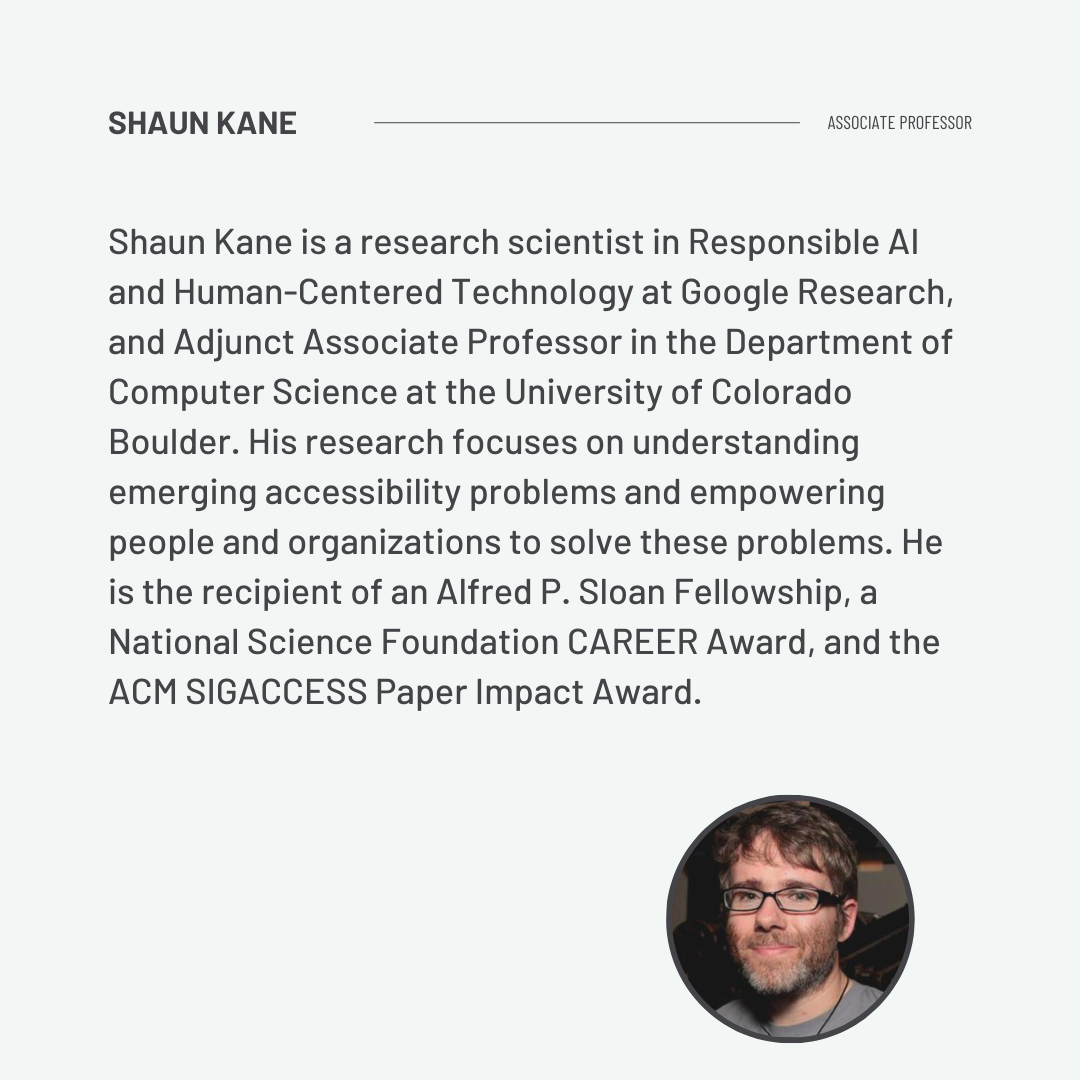
Dr. Shaun Kane
Shaun Kane is a research scientist in Responsible AI and Human-Centered Technology at Google Research, and Adjunct Associate Professor in the Department of Computer Science at the University of Colorado Boulder. His research focuses on understanding emerging accessibility problems and empowering people and organizations to solve these problems. He is the recipient of an Alfred P. Sloan Fellowship, a National Science Foundation CAREER Award, and the ACM SIGACCESS Paper Impact Award. He received his Ph.D. from The Information School at the University of Washington in 2011.
Awareness Months Archive
Embracing diverse perspectives, backgrounds, and experiences enrich the ACM community and strengthen ACM's ability to support the global computing community. Awareness months are a time dedicated to reflection, education, and engagement to understand and embrace the diverse membership within the ACM community. Our archive display the past and current celebrations ACM have created to foster an inclusive and equitable environment for all within the computing community.
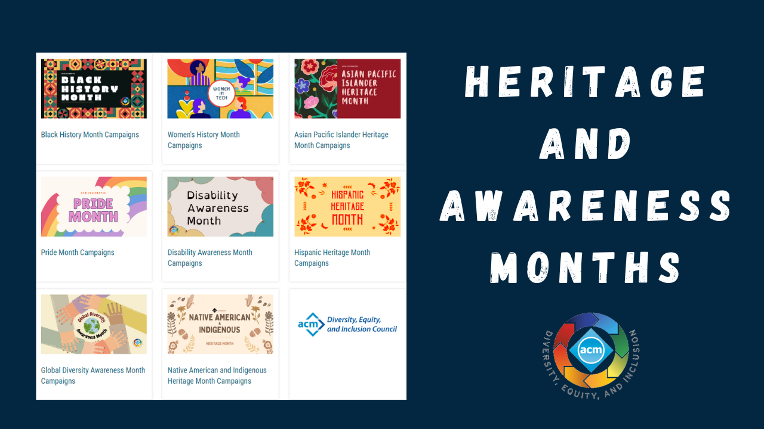
How Diverse Is Your Team?
ACM's Diversity, Equity, and Inclusion Council is an essential resource for SIGs, conferences, boards, and councils looking for best practices to improve diversity in their organization and develop programs with a broader reach in the computing community. Our guide provides examples of both inherent and acquired characteristics, which should be taken into consideration when looking at ways to improve the diversity of your team.

Words Matter
As part of ACM’s efforts to combat exclusion in the computing profession, ACM's Diversity, Equity, and Inclusion Council has launched an effort to replace offensive or exclusionary terminology in the computing field. They have developed a list of computing terms to be avoided in professional writing and presentations and offer alternative language. The Council plans to expand this list in the future and invites the community to submit suggestions for consideration.
